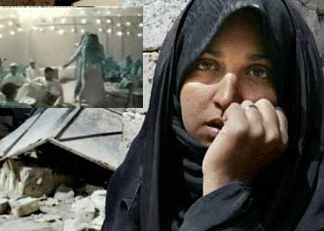
War is mainly a man’s game. Men like Osama Bin Laden send men like Muhammad Atta to bomb a New York building. Men like George Bush and Tony Blair react like, well like men, and take it out on men like Mullah Omar and Saddam Hussein by sending young men to dodge bullets and iuds in a real video-game scenario. Men like Nouri al-Maliki are purple-fingered into a Green Zone political club so that mostly men can wear uniforms or hide bombs in order to kill other men, as well as women and children. Even a pacifist like Jesus predicted no end to war and rumors of war.
Everyone, not just men, suffers in the manly game of war. But while some men think it honorable to kill others, the burden of war probably hits women harder than anyone else. Suicide bombs are as likely to tear apart female bodies as male bodies, as able to cut short the life of a child as trump the survival of the elderly. In Iraq we see the blood smears that mark death and hear the mourning that haunts the grieving of the left behind. But beyond the battlefield and the car-blown open markets the exercise of war bears more fruit, one that harks back to the forbidden fruit in the innocence of Eden.
I am talking about sex. Not the kind that makes families, but the commercial variety that often destroys family relations. Arms dealers are not the only villains in this war game; a similar dishonor falls on the sex trade which is a direct consequence of war’s displacement. Today’s New York Times has an article by Katherine Zoepf on the recent upsurge in the sex trade in Syria. Her conclusion is worth reading and thinking about.
Inexpensive Iraqi prostitutes have helped to make Syria a popular destination for sex tourists from wealthier countries in the Middle East. In the club’s parking lot, nearly half of the cars had Saudi license plates.
From Damascus it is only about six hours by car, passing through Jordan, to the Saudi border. Syria, where it is relatively easy to buy alcohol and dance with women, is popular as a low-cost weekend destination for groups of Saudi men.
And though some women of other nationalities, including Russians and Moroccans, still work as prostitutes in Damascus, Abeer, a 23-year-old from Baghdad working at the same club as Hiba, explained that the arriving Iraqis had pushed many of them out of business.
“From what I’ve seen, 70 percent to 80 percent of the girls working this business in Damascus today are Iraqis,†she said. “The rents here in Syria are too expensive for their families. If they go back to Iraq they’ll be slaughtered, and this is the only work available.â€
Morality mongers, who think nothing of justifying a war in the name of their God or look the other way as insurgent bombs tear apart human flesh, invariably blame women for becoming prostitutes, as though they do so just to be immoral. But the sex trade in Syria (and not just in Syria) is another casualty of the so-called “war on terrorism.” Consider the irony that while some Saudi money supports insurgents, some Saudis are supporting more directly in a different kind of flesh for cash. Religious politics makes strange bedfellows.
A quick question and I do not think it trivial. Who do you blame for original sin in the Christian theological sense: Adam or Eve? Eve took the bait and the first bite, according to a story written by men, but Adam knew better and took a bite as well. If woman is the “Devil’s gateway,” as the fashionable church father Tertullian put it, then Adam must be the Devil’s mansion. So who is to blame in the Syrian night clubs: Iraqi women who literally must choose between starving, death back home or prostitution, or the men who buy away not only the honor but the agency of young girls who have no family support or who must be the family support? If you side with Adam, you are still thinking like the men who started and perpetuate this war. If you side with Eve (let us say in the Gospel sense that he who is without sin can cast the first stone), then go the root cause of the problem. That problem is the war. Prostitution will not end when the war ends, but the agony for numerous Iraqi women will.
Daniel Martin Varisco